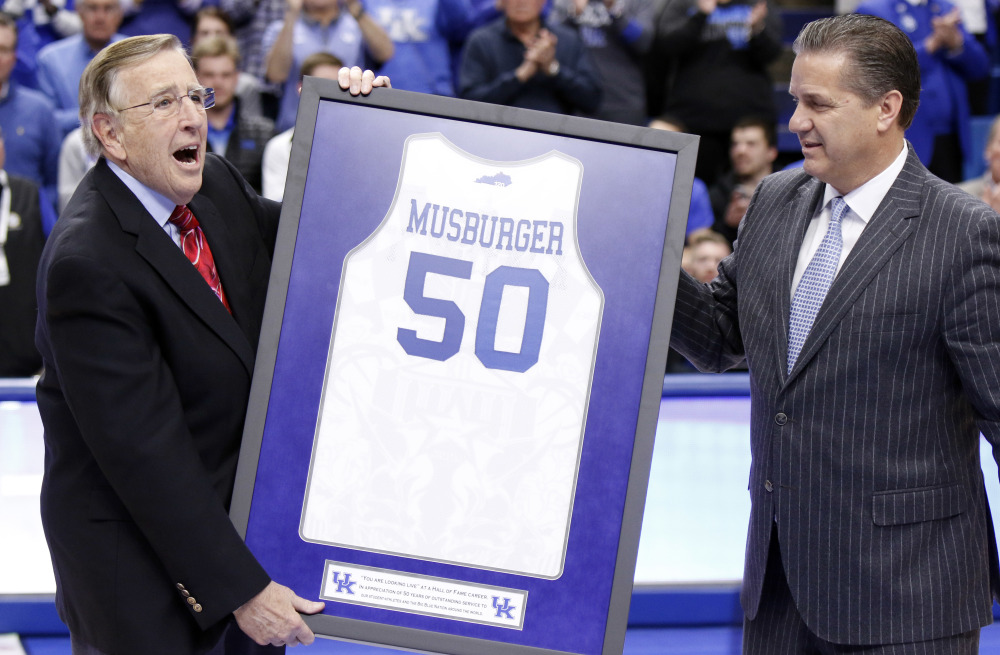By Mike DeSanto
Sports Editor
Let it be marked down in the history books: on Tuesday, Brent Musburger called the final game of his illustrious career, and boy, what a game it was.
Musburger got a proper send-off in the form of an overtime thriller between the Georgia Bulldogs and the number-eight ranked Kentucky Wildcats, at Rupp Arena in Lexington, Kentucky. Musburger is quite familiar with Rupp Arena, as it was the site of the NCAA March Madness Finals game between the Villanova Wildcats and the Georgetown Hoyas. With Musbuger on the call, the Wildcats upset the Hoyas to win their first National Championship (their second came last season over the North Carolina Tar Heels, a result I was not a fan of).
But that was just one of many big games Musburger would call. After beginning his career in 1968, and joining national sports broadcasts in 1975, Musburger began a stretch that would see him call games in the NFL, NCAA, NBA, MLB, the PGA Tour and even the US Open for tennis. He also had stints calling the College Baseball World Series and the Belmont Stakes, which is a part of horse racing’s Triple Crown. These all came in the CBS portion of his career.
In 1990, he moved to ABC and ESPN, where he continued to be a go-to broadcaster for many major events. He continued to be a part of NBA, NCAA basketball and football and golf broadcasts, but also added racing (NASCAR and Indy series) and soccer (2006 FIFA World Cup) to his repertoire. He was also involved in hosting the panel for Super Bowl XXV and the 1991 Pan-America Games.
Needless to say, if you’ve followed sports in the slightest over the last 40-plus years, you’ve heard his voice at some point.
But Musburger’s impact has gone beyond just the major games he has been a part of and the famous calls he has made. He has had an influence on an entire generation of broadcasters, which is a generation I am proud to be a part of.
Growing up as a sports fan in a sports-filled household, hearing many Brent Musburger broadcasts was inevitable. I didn’t always understand, and frankly didn’t care, who the guy talking was, so long as he made the game exciting. Musburger did that, ten-fold. Looking back, he actually called a lot more games that I watched than I remember, possibly because of my lack of attention span during that time (which hasn’t gotten much better, to be honest).
But highlights of calls before I was alive (he is 77 years old after all), leave me enthralled with the cadence and pitch of his voice, how he always seemed to have a calm undertone, despite how excited he clearly got. I know that doesn’t make a great amount of sense, but go listen to his call of Doug Flutie’s Hail Mary play against Miami, hopefully you’ll see what I mean. This is a prime example of how to carry the energy of a game, while remaining unbiased as to the result.
But the most amazing thing, as was pointed out to me by my friend during the Georgia-Kentucky game, his voice hasn’t changed a bit. Unlike most broadcasters, whose voice changes as they get older and can be damaged by yelling on major calls, Musburger literally sounds the exact same now as in the first broadcast that can be found of him. This shows another very important part of broadcasting, voice control.
He has obviously rarely, if ever, strained his voice to the point of doing damage to it. He has shown perfect control over his ability to project and control his voice whenever the situation arises where he must adjust it. The first situation that comes to mind is when a crowd gets louder and so the broadcaster must get louder to be heard, which I have heard Musburger do on multiple occasions. Instead of shouting to be heard, Musburger simply projects his voice more and it becomes clear.
Musburger is a prime example of a sports broadcaster who has done it the right way and has earned everything he has gotten over his long career.
So, thank you Mr. Musburger. We all truly appreciate everything you have done for sports and the broadcasting career. I hope that someday, I can be even half as good as you have always been. But, there is one thing that I know will always be true: there is only, and will only be, one Brent Musburger.
desantmj13@bonaventure.edu


